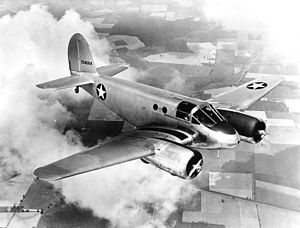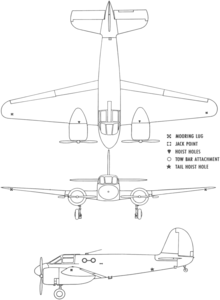Beechcraft AT-10 Wichita
| AT-10 Wichita | |
|---|---|
 | |
| General information | |
| Type | Military trainer aircraft |
| National origin | United States |
| Manufacturer | Beechcraft |
| Primary user | United States Army Air Forces |
| Number built | 2,371 |
| History | |
| Manufactured | 1942–1944 |
| Introduction date | 1942 |
| First flight | 1941 |
The Beechcraft AT-10 Wichita is an American World War II trainer built for the United States Army Air Forces (USAAF) by Beechcraft. It was used to train pilots for multi-engined aircraft such as bombers.
Development

Beechcraft began designing the Model 25 early in 1940 in response to the requirement of the then-named United States Army Air Corps (USAAC) for a small twin-engined aircraft suitable for use in training student pilots in the handling of multi-engined retractable landing gear aircraft. As there were concerns at the time about a future possible shortage of aluminium, part of the requirement was that the aircraft be built of "non-strategic" materials. Beechcraft met this requirement by designing the aircraft to be built primarily from wood.
The Model 25 prototype was given to the USAAC for evaluation, but it was destroyed in a crash on 5 May 1941. The following day Beechcraft began work on the Model 26, which was soon ready, making its first flight on 19 July the same year. The type was accepted and deliveries began to the USAAF under the designation AT-10 in February 1942 at a time when US military fortunes were at their nadir.
The type was named "Wichita" after Wichita, Kansas, the location of the Beechcraft factory. By the end of 1942, 748 had been delivered and were playing a part in training crews for the vast fleets of bomber and transport aircraft that were pouring off factory production lines all over the United States. Beechcraft production terminated in 1943 after it had delivered 1,771 AT-10s. Globe Aircraft built another 600 before production finally ceased the following year.
Operators
Surviving aircraft

- 41-27322 – AT-10 under restoration by AirCorps Aviation for the Cadet Air Corps Museum.[1][2]
- 42-35143 – AT-10 on static display at the National Museum of the United States Air Force in Dayton, Ohio.[3][4]
Specifications

Data from American Warplanes of World War II [5]
General characteristics
- Crew: Two
- Length: 34 ft 4 in (10.46 m)
- Wingspan: 44 ft 0 in (13.41 m)
- Height: 10 ft 4 in (3.15 m) [6]
- Wing area: 298 sq ft (27.7 m2)
- Empty weight: 4,750 lb (2,155 kg)
- Max takeoff weight: 6,130 lb (2,781 kg)
- Powerplant: 2 × Lycoming R-680-9 air-cooled radial engines, 295 hp (220 kW) each
Performance
- Maximum speed: 198 mph (319 km/h, 172 kn)
- Cruise speed: 168 mph (270 km/h, 146 kn) (75% power)[7]
- Range: 770 mi (1,240 km, 670 nmi)
- Service ceiling: 16,900 ft (5,200 m)
- Rate of climb: 1,150 ft/min (5.8 m/s) [7]
See also
Aircraft of comparable role, configuration, and era
Related lists
References
Notes
- ^ "Beechcraft AT-10 Wichita". AirCorps Aviation. Retrieved 29 January 2023.
- ^ Cravens, Chuck (4 May 2017). "Cadet AirCorps Museum AT-10 Project". AirCorps Aviation. Retrieved 29 January 2023.
- ^ "Beech AT-10 Wichita". National Museum of the United States Air Force. Retrieved 29 January 2023.
- ^ "Airframe Dossier - Beech AT-10 Wichita, s/n 42-35143 USAAF, c/n 660-GF". Aerial Visuals. Retrieved 29 January 2023.
- ^ Donald 1995, p.8.
- ^ Air Force Museum Fact Sheet. National Museum of the US Air Force. Retrieved 4 Dec 2016.
- ^ a b Pelletier 1995, p. 86
Bibliography
- Donald, David (editor.) American Warplanes of World War II. London:Aerospace Publishing, 1995. ISBN 1-874023-72-7.
- Lawrence, Joseph (1945). The Observer's Book Of Airplanes. London and New York: Frederick Warne & Co.
- Pelletier, A. J. Beech Aircraft and their Predecessors. Annapolis, Maryland, USA: Naval Institute Press, 1995. ISBN 1-55750-062-2.
- Phillips, Edward H., Beechcraft - Pursuit of Perfection, A History of Beechcraft Airplanes. Eagan, Minnesota:Flying Books, 1992. ISBN 0-911139-11-7.
- Taylor, M. J. H. ed. Jane's American Fighting Aircraft of the 20th Century Mallard Press. ISBN 0-7924-5627-0
